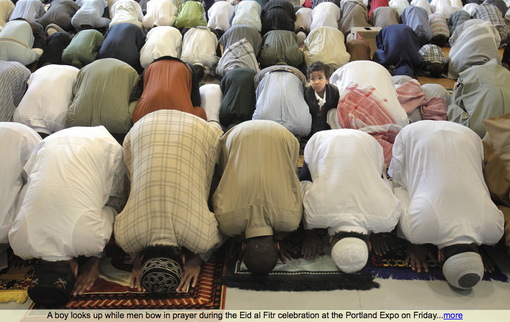In his latest column, Nicholas Kristof poses some important questions that undermine the myth of “fair and balanced” journalism. He recounts the story of the photo above, taken by Portland Press Herald photographer Gregory Rec on Friday, September 10, showing local Muslims gathering to pray for Eid al Fitr, marking the end of Ramadan. It appeared on the front page — the kind of image accompanied by a feel-good story about “faith and forgiveness” (as the headline said), that has provided the traditional, benign, pro-religion front-page news-feature in American papers for decades. No problem there.
The problem was the date of the paper.
The day of this issue’s publication, was September 11. And some readers were outraged that these images of American Muslims praying should appear on the anniversary of a deadly attack by radical avowed Muslims nine years earlier. If they’d waited for the next day’s (September 12) paper, with coverage of the memorials that took place on September 11, they might have found the balance they were looking for, but on September 11 the paper was bombarded with complaints.
The next day, Richard Connor, the editor and publisher, issued an apology “to those offended”:
We made a news decision on Friday that offended many readers and we sincerely apologize for it.
Many saw Saturday’s front-page story and photo regarding the local observance of the end of Ramadan as offensive, particularly on the day, Sept. 11, when our nation and the world were paying tribute to those who died in the 9/11 terrorist attacks nine years ago.
We have acknowledged that we erred by at least not offering balance to the story and its prominent position on the front page.
What you are reading today was the planned coverage of the 9/11 events. We believed that the day after the anniversary would be the appropriate occasion to provide extensive news coverage of the events and observances conducted locally and elsewhere.
He also quoted one of his personal responses to an offended reader:
“Our editors believed that 3,000 persons marking the passage of a religious observance and congregating in Portland to do so was news. I believe that decision was correct but I also believe we should have handled it in a more sensitive way.”
He did not elaborate on what “a more sensitive way” might have been. He didn’t have much chance to, because in the deluge that immediately followed his apology he realized he needed to issue another apology to apologize for the first apology. In this one, he said he wished he’d just stuck to this simple statement:
Our coverage of the conclusion of the local Ramadan observance was excellent and we are proud of it. We did not adequately cover 9/11 on the 9/11 anniversary, which also should have been front-page news, in my opinion.
OK, so you see the dilemma. We’re back to recognizing the feelings of those who were offended — just as we were discussing at another post on this very blog September 10. (And, by the way, Hitler adopted a dog he named Fox — a factual non sequitur that offends my feelings and therefore needs to be balanced by something that’s not offensive to me.)
One way or another, the Portland Herald Press will have to figure out how it wants to deal with the sensitivities of offended readers of all stripes. And this is where Nicholas Kristof comes in. After recounting this story in his column (“Message to Muslims: I’m Sorry“), he reports:
I called Mr. Connor, and he seems like a nice guy. Surely his front page isn’t reserved for stories about Bad Muslims, with articles about Good Muslims going inside. Must coverage of law-abiding Muslims be “balanced” by a discussion of Muslim terrorists?
Ah, balance — who can be against that? But should reporting of Pope Benedict’s trip to Britain be “balanced” by a discussion of Catholic terrorists in Ireland? And what about journalism itself?
I interrupt this discussion of peaceful journalism in Maine to provide some “balance.” Journalists can also be terrorists, murderers and rapists. For example, radio journalists in Rwanda promoted genocide.
Given that there are more than one and a half billion Muslims in the world, and a handful of them were responsible for the attacks of September 11, 2001 — and none of the killers was from Maine, or anywhere in the USA — you might think that celebrating Islam on the front page every day for the last nine years still wouldn’t “balance” what those 19 hijackers (all but four Saudi Arabian) did on that one morning. (And Ramadan, which is held in the ninth month of the Islamic calendar, was in November in 2001 according to the Gregorian calendar, so that wasn’t related to the events of 9/11, either.) We could go on and on…
Chances are, any single account that attempts to present itself as “fair and balanced” isn’t. Reporting that one spokesperson said “yes,” while an opposing spokesperson said “no” constitutes neither fairness nor balance. Even the FCC’s much-hated-and-debated Equal Time Rule for broadcast television and radio stations (abolished by Ronald Reagan’s 1987 veto) was intended to allow the public access to different points of view over time:
In 1949, the first clear definition of the fairness doctrine emerged. The FCC said, in its Report on Editorializing, “[T]he public interest requires ample play for the free and fair competition of opposing views, and the commission believes that the principle applies … to all discussion of issues of importance to the public.” The doctrine had two parts: it required broadcasters (1) to cover vital controversial issues in the community and (2) to provide a reasonable opportunity for the presentation of contrasting viewpoints. In time, additional rules were added. The so-called personal attack rule required broadcasters to allow opportunity for rebuttal to personal attacks made during the discussion of controversial issues. The “political editorializing” rule held that broadcasters who endorsed a candidate for political office had to give the candidate’s opponent a reasonable opportunity to respond.
Some (who shall be nameless) have found this responsibility an infringement on corporate “free speech” rights. As part of Fox News’s promotional slogan, the words “Fair and Balanced” have become rather meaningless. But at least the “and” indicates that “fairness” and “balance” are separate and distinct qualities.
So, where does it end? Kristof writes:
Radicals tend to empower radicals, creating a gulf of mutual misunderstanding and anger. Many Americans believe that Osama bin Laden is representative of Muslims, and many Afghans believe that the Rev. [Yosemite Sam] (who talked about burning Korans) is representative of Christians.
Many Americans honestly believe that Muslims are prone to violence, but humans are too complicated and diverse to lump into groups that we form invidious conclusions about. We’ve mostly learned that about blacks, Jews and other groups that suffered historic discrimination, but it’s still O.K. to make sweeping statements about “Muslims” as an undifferentiated mass.
In my travels, I’ve seen some of the worst of Islam: theocratic mullahs oppressing people in Iran; girls kept out of school in Afghanistan in the name of religion; girls subjected to genital mutilation in Africa in the name of Islam; warlords in Yemen and Sudan who wield AK-47s and claim to be doing God’s bidding.
But I’ve also seen the exact opposite: Muslim aid workers in Afghanistan who risk their lives to educate girls; a Pakistani imam who shelters rape victims; Muslim leaders who campaign against female genital mutilation and note that it is not really an Islamic practice; Pakistani Muslims who stand up for oppressed Christians and Hindus; and above all, the innumerable Muslim aid workers in Congo, Darfur, Bangladesh and so many other parts of the world who are inspired by the Koran to risk their lives to help others. Those Muslims have helped keep me alive, and they set a standard of compassion, peacefulness and altruism that we should all emulate.
I’m sickened when I hear such gentle souls lumped in with Qaeda terrorists, and when I hear the faith they hold sacred excoriated and mocked. To them and to others smeared, I apologize.











